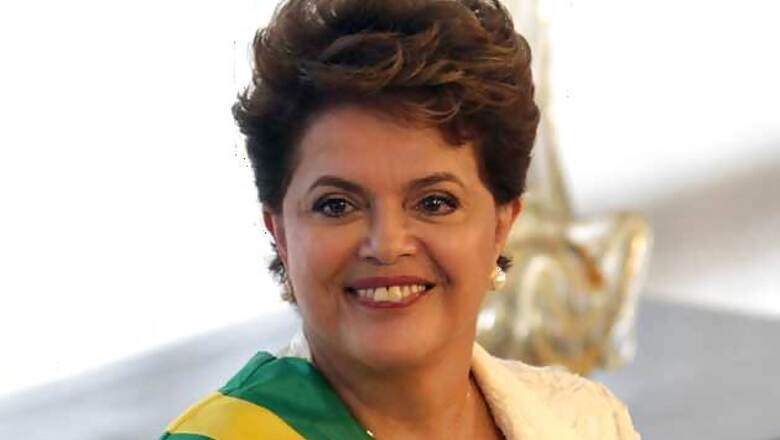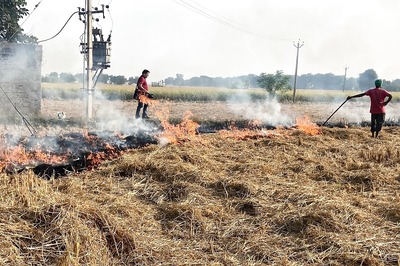
views
Sao Paulo: A tight runoff campaign for Brazil's presidency kicked off on Monday with leftist incumbent Dilma Rousseff and pro-business rival Aecio Neves racing to win over supporters of the third-placed candidate after she was knocked out of the election.
Neves, a centrist senator who had been widely written off until a few days before Sunday's first-round vote, rode a late surge in support to grab second place with 33.6 per cent of the vote.
Rousseff led with 41.6 per cent and they now face each other in an Oct. 26 runoff to decide Brazil's most unpredictable race in decades.
Rousseff remains a slight favorite as she has strong support among Brazil's poor but Neves is within striking distance and is expected to pick up most of the 21 percent of voters who backed the third-placed finisher, environmentalist Marina Silva.
Neves reached out to Silva on Monday, stressing the similarities of their proposals to reduce the size of government and free up private enterprise.
He said he was the candidate of change, a slogan dear to Silva who sought to end the horse-trading of Brazilian politics.
He also fired back at Rousseff, who said he represents the "ghosts of the past," a reference to an austerity drive, layoffs and the privatization of state assets when his Brazilian Social Democracy Party, or PSDB, last held power from 1995-2002.
"The truth is Brazilians are far more concerned with the monsters of the present: high inflation, recession and corruption," Neves said.
Brazil's main stock index .BVSP jumped 4.72 per cent on Monday, its biggest one-day rise in more than three years, as investors were cheered by Neves' strong showing. The real currency BRL= closed 1.46 per cent stronger.
Latin America's largest economy has been stuck in a rut for nearly four years under Rousseff, and most of Brazil's business community and Wall Street investors have made no secret of their desire for change.
Rousseff returned to the offensive on Monday in a campaign that is increasingly being drawn along class lines.
"Investors don't win elections in Brazil. They are won with the votes of the Brazilian people," she told reporters.
She also attacked Neves' top economic policy advisor, former central bank president Arminio Fraga, saying that inflation went beyond the official target on his watch and interest rates hit 45 per cent.
Wooing Silva
Both Rousseff and Neves will try to win over Silva's supporters.
She had soared in opinion polls earlier in the race and looked on track to win the election in a runoff. Her support crumbled in the homestretch amid questions about her shifting views on major issues, but she is admired by many voters and could still help swing the election with an endorsement.
Top Rousseff aide Gilberto Carvalho said on Sunday night that he had already spoken to the head of Silva's Brazilian Socialist Party, Roberto Amaral, to ask for their support.
"He asked for calm and more time to talk with the party," Carvalho told reporters.
Silva called both Rousseff and Neves on Monday but they said they did not raise the issue of her endorsement in the calls.
Silva's party will meet on Wednesday and a decision on whether to formally back a candidate in the runoff is expected by Thursday, party leaders said.
Most observers believe Rousseff has very little chance of winning formal backing from Silva, after unleashing a barrage of negative ads that contributed to her collapse.
Instead, her best hope may be for Silva to stay neutral, as she did after finishing third in the 2010 race, which could allow Rousseff to peel away her more left-leaning supporters.
The Silva and Neves camps shared broadly similar market-friendly platforms and Silva's campaign chief, Walter Feldman, is a former PSDB leader with enduring ties to the party.
Battle between visions
The runoff will be a battle between opposing visions for Brazil: the state-led capitalism of the ruling Workers' Party, and the market-friendly policies promised by Neves and the PSDB.
The two parties are arch-rivals and between them they have run Brazil for the last 20 years. Rousseff and her party accuse the PSDB of favoring the rich, a potent accusation in a country where more than half of voters live in households earning less than $1,000 a month.
Polls taken prior to Sunday showed Rousseff would beat Neves by as much as 8 percentage points in a runoff, although Neves' dramatic turnaround gives him clear momentum.
That could be important in a race in which most voters have told pollsters they want change from the government but many also have misgivings about kicking Rousseff out of power.
The first opinion polls for the runoff are expected on Thursday. They could face greater scrutiny failed to project the scale of Neves' late first-round surge.
As recently as 10 days ago, polls showed him stuck in third place and trailing Silva by 9 percentage points.
But when Silva's lack of party support and reputation for unpredictable decisions scared away many voters at the last minute, Neves' consistent pro-business message and calm, presidential air won them over.
Expectations of a Rousseff victory had in recent days battered stocks and driven the currency to a five-year low. Although markets snapped back on Monday, they are likely to be volatile over the next three weeks.
Despite falling investment, weak consumer confidence and a loss of competitiveness by Brazilian manufacturers, Rousseff and her supporters blame the economic woes on international instability, not her policies. Unemployment has remained near historic lows, and wages have been steady.
To win, Neves may have to distance himself from the PSDB's last time in government, a period that saw important pro-market reforms but is remembered by most voters for high unemployment and painful budget cuts.
He must also convince voters that his promise to jumpstart the economy won't come at the expense of social programs, especially a popular monthly stipend that low-income families receive in exchange for keeping their children in schools.




















Comments
0 comment